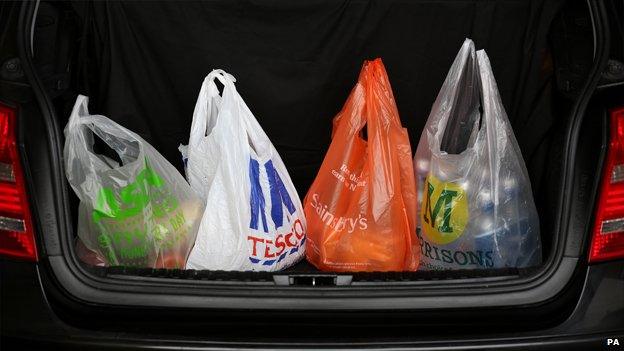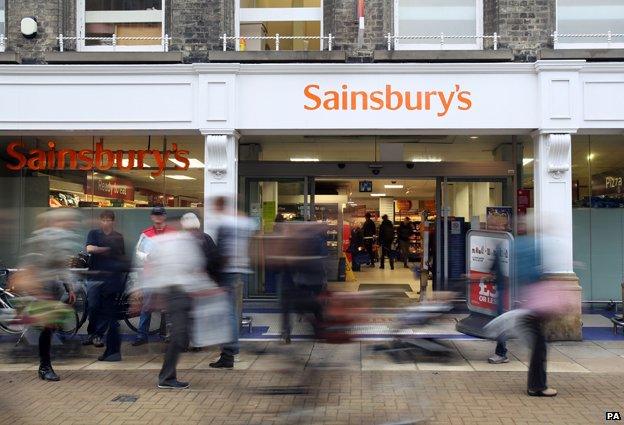Sainsbury's and a fragile economy
- Published
- comments

In recessions, supermarket groups normally perform better than other businesses, because even when we are strapped for cash, we all have to eat.
This last recession and then the long years of economic stagnation were a bit different from previous slumps, in that cash-strapped households became much more price conscious and altered their shopping habits in a fairly fundamental way.
So they switched their purchases to the so-called hard discounters, Aldi and Lidl, they (we) were more parsimonious in the weekly big shop, they used convenience stores for top-ups, and they generally behaved in a way that limited the growth in sales and profits of the big supermarket chains.
Even so, compared with most other parts of the economy, the supermarkets did OK. They faced challenging conditions, but were a million miles from crisis - although the big daddy of supermarket groups, Tesco, was certainly flustered as Terry Leahy's successor as boss, Phil Clarke, looked under the bonnet and found something more fundamental than a tune-up was needed.
But here is the interesting question. Now that the economy is apparently growing very fast again (at an annual rate of more than 3% per year according to the Bank of England's latest assessment and forecast) what does it mean that the grocery market is not doing well at all?
You will recall the recent mess disclosed at Wm Morrison.
And today, J Sainsbury saw underlying sales decline by a relatively substantial 3.1% (excluding fuel) for the first three-month period in 36 quarters (that's nine years, in most people's money).
When the longstanding chief executive, Justin King - who has overseen Sainsbury's rehabilitation - announced his departure recently, I joked he was getting out at the apposite moment. Perhaps that wasn't a joke.
He says that Sainsbury is simply performing in line with the market as a whole, and has maintained its market share (at 17%).
King: "The market is now growing at its slowest rate since 2005, with falling food inflation in particular benefiting consumers."
It is worth unpicking that statement by King.

The first interesting thing he says is that the worst recent period for supermarkets was in 2005, long before the 2008 crash. Which confirms that there is very little direct correlation between how supermarkets perform as a group and the overall health of the economy.
The second however is his assertion that food inflation is low and falling. Which seems a bit odd, since internationally the basic price of foods has been pushed up by drought and disease, while domestically produced food has been inflated by the great British deluge of recent months.
Presumably what he is talking about is what we might call the Aldi factor - that intense competition between the supermarkets is forcing them to cut prices, and accept lower profit margins.
Which is great for shoppers (to state the bleedin' obvious) - it would be belatedly welcome news for living standards, if we were buying the same or a bit more from the supermarkets, for less of an outlay.
But this squeeze on margins and profits ain't so wonderful for owners of supermarkets.
But what really interests me is what all this says about the strength and sustainability of Britain's economic recovery.
As you know (you do, you do), that recovery has been driven by more than two years of revival in consumption, as households have reduced how much they save.
But what is very striking is that we are not taking advantage of lower prices at the supermarkets to buy more from them, or buy more extravagantly.
So there appears to be very little confidence among us that our living standards are set to rise in any kind of substantial or durable way.
What should we therefore conclude from the current supermarket malaise?
Well, just to ram home the point, for all their economic importance, and for all the money they vacuum from our wallets, there is no simple direct correlation between the performance of supermarkets and the performance of the economy as a whole.
But nor are they completely quarantined from economic conditions.
So it is probably reasonable to conclude from the trouble at Morrison, the end of the long boom at Sainsbury and the general pressure on the sector, that Britain's consumer-led recovery remains fragile.